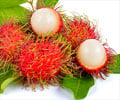Even fruit flies feel the need for sleep after a day of buzzing around, a new study has found.

Researchers saw this increase in the number of synapses, the junctions between nerve cells where electrical or chemical signals pass to the next cell, in three neuronal circuits they studied.
The richer "wake experience" resulted in both larger synaptic growth and greater sleep need.
The study provides structural evidence for the theory that "synaptic homeostasis" is one of the key reasons all animals need sleep.
Researchers Dr. Daniel Bushey, Dr. Giulio Tononi and Dr. Chiara Cirelli of the Wisconsin Center for Sleep and Consciousness also looked at the role the gene implicated in Fragile X syndrome plays in re-normalizing the brain during sleep.
In one experiment, researchers took young fruit flies that spent the first days of their lives alone in single tubes too small to allow flying. Then they released them in groups into a large lighted chamber that allowed them to fly around together for their 12-hour day.
Advertisement
After their mall visit, the flies were put back into the single tubes and slept much longer for at least one day. Their synapses returned to normal size after sleep.
Advertisement
"Sleep prunes back the new synapses; you have to create space for synapses to grow again or you can't learn again the next day," Cirelli, associate professor of psychiatry at the School of Medicine and Public Health, said.
"Even more importantly, the pruning saves energy, and for the brain, energy is everything. Learning without sleep is unsustainable from an energy point of view," Cirelli stated.
The findings have been published in the journal Science.
Source-ANI















